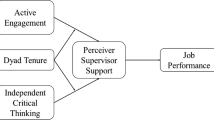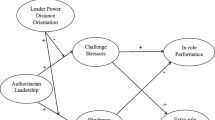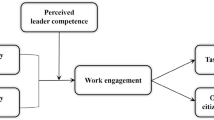Abstract
The effect of authentic leadership and leader competency on employee job performance has received growing attention in the past decades; however, few studies have simultaneously integrated these two leadership perspectives. We have thus developed a mediated moderation model to test the interactive effect of authentic leadership and competency on followers’ job performance through work engagement. Based on a sample of 248 subordinate–supervisor pairs, hierarchical regression analyses reveal that (1) authentic leadership positively relates to followers’ task performance and organizational citizenship behavior (OCB); (2) leader competency moderates the relationship between authentic leadership and OCB; (3) and followers’ work engagement mediates the main effect of authentic leadership and the interactive effect of authentic leadership and competency on followers’ task performance and OCB. All the three results are consistent with our hypotheses.


Similar content being viewed by others
References
Algera, P., & Lips-Wiersma, M. (2012). Radical authentic leadership: Co-creating the conditions under which all members of the organization can be authentic. The Leadership Quarterly, 23(1), 118–131.
Arkin, R. M. (1981). Self-presentation styles. In J. Tedeschi (Ed.), Impression management theory and research (pp. 311–333). New York: Academic Press.
Avolio, B. J., & Gardner, W. L. (2005). Authentic leadership development: Getting to the root of positive forms of leadership. The Leadership Quarterly, 16(3), 315–338.
Avolio, B. J., Gardner, W. L., Walumbwa, F. O., Luthans, F., & May, D. R. (2004). Unlocking the mask: A look at the process by which authentic leaders impact follower attitudes and behaviors. The Leadership Quarterly, 15(6), 801–823.
Avolio, B. J., Walumbwa, F. O., & Weber, T. J. (2009). Leadership: Current theories, research, and future directions. Annual Review of Psychology, 60, 421–449.
Azanza, G., Mariano, J. A., Molero, F., & Mangin, J.-P. L. (2015). The effects of authentic leadership on turnover intention. Leadership and Organization Development Journal, 36(8), 955–971.
Bass, B. M. (1960). Leadership, psychology and organizational behavior. New York: Harper.
Baron, R. M., & Kenny, D. A. (1986). The moderator-mediator variable distinction in social psychological research: Conceptual, strategic and statistical considerations. Journal of Personality and Social Psychology, 51, 1173–1182.
Baumeister, R. F., Smart, L., & Boden, J. M. (1996). Relation of threatened egotism to violence and aggression: The dark side of high self-esteem. Psychological Review, 103, 5–33.
Breevaart, K., Bakker, A., Demerouti, E., & van den Heuvel, M. (2015). Leader-member exchange, work engagement, and job performance. Journal of Managerial Psychology, 30(7), 754–770.
Brislin, R. W. (1980). Translation and content analysis of oral and written materials. In H. C. Triandis & J. W. Berry (Eds.), Handbook of cross-cultural psychology (Vol. 2, pp. 389–444). Boston: Allyn & Bacon.
Chen, X.-P., Hui, C., & Sego, D. J. (1998). The role of organizational citizenship behavior in turnover: Conceptualization and preliminary tests of key hypotheses. Journal of Applied Psychology, 83(6), 922–931.
Chen, Y., Ferris, D. L., Kwan, H. K., Yan, M., Zhou, M., & Hong, Y. (2013). Self-love’s lost labor: A self-enhancement model of workplace incivility. Academy of Management Journal, 56(4), 1199–1219.
Christian, M. S., Garza, A. S., & Slaughter, J. E. (2011). Work engagement: A quantitative review and test of its relations with task and contextual performance. Personnel Psychology, 64(1), 89–136.
Clapp-Smith, R., Vogelgesang, G. R., & Avey, J. B. (2009). Authentic leadership and positive psychological capital: The mediating role of trust at the group level of analysis. Journal of Leadership and Organizational Studies, 15(3), 227–240.
Draganidis, F., & Mentzas, G. (2006). Competency based management: A review of systems and approaches. Information Management & Computer Security, 14(1), 51–64.
Dutton, J. E., Dukerich, J. M., & Harquail, C. V. (1994). Organizational images and member identification. Administrative Science Quarterly, 39, 57–88.
Evan, W., & Zelditch, M. (1961). A laboratory experiment on bureaucratic authority. American Sociological Review, 26, 883–893.
Ferris, D. L., Lian, H., Brown, D. J., Pang, F. X. J., & Keeping, L. M. (2010). Self-esteem and job performance: The moderating role of self-esteem contingencies. Personnel Psychology, 63, 561–593.
Gardner, W. L., Cogliser, C. C., Davis, K. M., & Dickens, M. P. (2011). Authentic leadership: A review of the literature and research agenda. The Leadership Quarterly, 22(6), 1120–1145.
George, W., & Sims, P. (2007). True north: Discover your authentic leadership. San Francisco: Jossey-Bass.
Giallonardo, L. M., Wong, C. A., & Iwasiw, C. L. (2010). Authentic leadership of preceptors: Predictor of new graduate nurses’ work engagement and job satisfaction. Journal of Nursing Management, 18(8), 993–1003.
Goldstein, H. W., Yusko, K. P., & Nicolopoulos, V. (2001). Exploring black–white subgroup differences of managerial competencies. Personnel Psychology, 54(4), 783–807.
Gong, Y., Kim, T. Y., Zhu, J., & Lee, D. R. (2013). A multilevel model of team goal orientation, information exchange, and creativity. Academy of Management Journal, 56, 827–851.
Gramzow, R. H. (2011). Academic exaggeration: Pushing self-enhancement boundaries. In M. D. Alicke & C. Sedikides (Eds.), Handbook of self-enhancement and self-protection (pp. 455–471). New York: Guilford.
Harman, H. H. (1960). Modern factor analysis. Chicago: University of Chicago Press.
Hassan, A., & Ahmed, F. (2011). Authentic leadership, trust and work engagement. International Scholarly and Scientific Research & Innovation, 5(8), 1036–1042.
Hmieleski, K. M., Cole, M. S., & Baron, R. A. (2012). Shared authentic leadership and new venture performance. Journal of Management, 38, 1476–1499.
Hooijberg, R., & Choi, J. (1999). From Austria to the United States and from evaluating therapists to developing cognitive resources theory: An interview with Fred Fiedler. The Leadership Quarterly, 10, 653–665.
House, R. J., & Baetz, J. L. (1979). Leadership: Some empirical generalizations and new research directions. Research in Organizational Behavior, 1, 341–423.
Hsieh, C., & Wang, D. (2015). Does supervisor-perceived authentic leadership influence employee work engagement through employee-perceived authentic leadership and employee trust? The International Journal of Human Resource Management, 26(18), 1–20.
Hsiung, H.-H. (2012). Authentic leadership and employee voice behavior: A multi-level psychological process. Journal of Business Ethics, 107, 349–361.
Ilies, R., Morgeson, F. P., & Nahrgang, J. D. (2005). Authentic leadership and eudaemonic well-being: Understanding leader–follower outcomes. The Leadership Quarterly, 16(3), 373–394.
Jensen, S. M., & Luthans, F. (2006). Entrepreneurs as authentic leaders: Impact on employees’ attitudes. Leadership and Organization Development Journal, 27(8), 646–666.
Jordan, A. H., & Audia, P. G. (2012). Self-enhancement and learning from performance feedback. Academy of Management Review, 37, 211–231.
Justis, R. T., Kedia, B. L., & Stephens, D. B. (1978). The effect of position power and perceived task competence on trainer effectiveness: A partial utilization of Fiedler’s contingency model of leadership. Personnel Psychology, 31(1), 83–93.
Kahn, W. A. (1990). Psychological conditions of personal engagement and disengagement at work. Academy of Management Journal, 33(4), 692–724.
Kim, T.-Y., Cable, D., Kim, S., & Wang, J. (2009). Emotional competence and work performance: The mediating effect of proactivity and the moderating effect of job autonomy. Journal of Organizational Behavior, 90, 983–1000.
Korman, A. K. (2001). Self-enhancement and self-protection: Toward a theory of work motivation. In M. Erez, U. Kleinbeck, & H. Thierry (Eds.), Work motivation in the context of a globalizing economy (pp. 121–130). Mahwah, NJ: Erlbaum.
Kruglanski, A. W. (1980). Lay epistemologic process and contents: Another look at attribution theory. Psychological Reviews, 87, 70–87.
Leroy, H., Anseel, F., Gardner, W. L., & Sels, L. (2015). Authentic leadership, authentic followership, basic need satisfaction, and work role performance: A cross-level study. Journal of Management, 41(6), 1677–1697.
Leroy, H., Palanski, M. E., & Simons, T. (2012). Authentic leadership and behavioral integrity as drivers of follower commitment and performance. Journal of Business Ethics, 107, 255–264.
Levenson, A. R., Van der Stede, W. A., & Cohen, S. G. (2006). Measuring the relationship between managerial competencies and performance. Journal of Management, 32(3), 360–380.
Liu, J., Lee, C., Hui, C., Kwan, H. K., & Wu, L. Z. (2013). Idiosyncratic deals and organizational contribution: The mediating roles of social exchange and self-enhancement. Journal of Applied Psychology, 98(5), 832–840.
Luthans, F., & Avolio, B. J. (2003). Authentic leadership development. In K. S. Cameron, J. E. Dutton, & R. E. Quinn (Eds.), Positive organizational scholarship: Foundations of a new discipline (pp. 241–261). San Francisco: Barrett-Koehler.
MacKinnon, D. P., Lockwood, C. M., & Williams, J. (2004). Confidence limits for the indirect effect: Distribution of the product and resampling methods. Multivariate Behavioral Research, 39, 99–128.
Markos, S., & Sridevi, M. S. (2010). Employee engagement: The key to improving performance. International Journal of Business and Management, 5(12), 89–97.
Mausner, B. (1953). Studies in social interaction: Effect of variation in one partner’s prestige on the interaction of observer pairs. Journal of Applied Psychology, 37(5), 391–393.
Mausner, B. (1954). The effect of one partner’s success in a relevant task on the interaction of observer pairs. The Journal of Abnormal and Social Psychology, 49(4), 557–560.
May, D. R., Chan, A., Hodges, T., & Avolio, B. J. (2003). Developing the moral component of authentic leadership. Organizational Dynamics, 32(3), 247–260.
O’Boyle, E. H., Humphrey, R. H., Pollack, J. M., Hawver, T. H., & Story, P. A. (2011). The relation between emotional intelligence and job performance: A meta-analysis. Journal of Organizational Behavior, 32(5), 788–818.
Organ, D. W. (1988). Organizational citizenship behavior: The good soldier syndrome. Lexington, MA: Lexington Books.
Owens, B., & Hekman, D. R. (2012). Modeling how to grow: An inductive examination of humble leader behaviors, outcomes, and contingencies. Academy of Management Journal, 55(4), 787–818.
Penger, S., & Černe, M. (2014). Authentic leadership, employees’ job satisfaction, and work engagement: A hierarchical linear modelling approach. Economic Research, 27(1), 508–526.
Peus, C., Wesche, J. S., Streicher, B., Braun, S., & Frey, D. (2012). Authentic leadership: An empirical test of its antecedents, consequences, and mediating mechanisms. Journal of Business Ethics, 107, 331–348.
Podsakoff, P. M., MacKenzie, S. B., Lee, J.-Y., & Podsakoff, N. P. (2003). Common method biases in behavioral research: A critical review of the literature and recommended remedies. Journal of Applied Psychology, 88(5), 879–903.
Podsakoff, P. M., Todor, W. D., & Schuler, R. (1983). Leader expertise as a moderator of the effects of instrumental and supportive leader behaviors. Journal of Management, 9, 173–185.
Preacher, K. J., Rucker, D. D., & Hayes, A. F. (2007). Assessing moderated mediation hypotheses: Theory, methods, and prescriptions. Multivariate Behavioral Research, 42(1), 185–227.
Rich, B. L., LePine, J. A., & Crawford, E. R. (2010). Job engagement: Antecedents and effects on job performance. Academy of Management Journal, 53(3), 617–635.
Robinson, I. (2006). Human resource management in organisations. London: CIPD.
Salanova, M., & Schaufeli, W. B. (2008). Job resources, engagement and proactive behaviour. International Journal of Human Resource Management, 19(1), 116–131.
Schaufeli, W. B., & Bakker, A. B. (2004). Job demands, job resources, and their relationship with burnout and engagement: A multi-sample study. Journal of Organizational Behavior, 25(3), 293–315.
Schaufeli, W. B., Salanova, M., Gonzalez-Roma, V., & Bakker, A. B. (2002). The measurement of engagement and burnout and: A confirmative analytic approach. Journal of Happiness Studies, 3(1), 71–92.
Sedikides, C., & Strube, M. J. (1997). Self-evaluation: To thine ownself be good, to thine own self be sure, to thine own self be true, and to thine own self be better. Advances in Experimental Social Psychology, 29, 209–269.
Sosik, J. J., Juzbasich, J., & Chun, J. (2011). Effects of moral reasoning and management level on ratings of charismatic leadership, in-role and extra-role performance of managers: A multi-source examination. Leadership Quarterly, 22, 434–450.
Stevens, C. K. (1997). Effects of preinterview beliefs on applicants’ reactions to campus interviews. Academy of Management Journal, 40, 947–966.
Sulea, C., Virga, D., Maricutoiu, L. P., Schaufeli, W., Dumitru, C. Z., & Sava, F. A. (2012). Work engagement as mediator between job characteristics and positive and negative extra-role behaviors. Career Development International, 17(3), 1–32.
Tett, R. P., Guterman, H. A., Bleier, A., & Murphy, P. J. (2000). Development and content validation of a hyper dimensional taxonomy of managerial competence. Human Performance, 13(3), 205–251.
Tourangeau, R., Rips, L. J., & Rasinski, K. (2000). The psychology of survey response. Cambridge: Cambridge University Press.
Walumbwa, F. O., Avolio, B. J., Gardner, W. L., Wernsing, T. S., & Peterson, S. J. (2008). Authentic leadership: Development and validation of a theory-based measure. Journal of Management, 34(1), 89–126.
Wang, H., Sui, Y., Luthans, F., Wang, D., & Wu, Y. (2014). Impact of authentic leadership on performance: Role of followers’ positive psychological capital and relational processes. Journal of Organizational Behavior, 35(1), 5–21.
Williams, L. J., & Anderson, S. E. (1991). Job satisfaction and organizational commitment as predictors of organizational citizenship and in-role behaviors. Journal of Management, 17(3), 601–617.
Wong, C. A., & Cummings, G. G. (2009). The influence of authentic leadership behaviors on trust and work outcomes of health care staff. Journal of Leadership Studies, 3(2), 6–23.
Wong, C. A., Spence Laschinger, H. K., & Cummings, G. G. (2010). Authentic leadership and nurses’ voice behaviour and perceptions of care quality. Journal of Nursing Management, 18(8), 889–900.
Yagil, D., & Medler-Liraz, H. (2014). Service employees’ trait authenticity and customer satisfaction. In W. J. Zerbe, N. M. Ashkanasy, & C. E. J. Härtel (Eds.), Individual sources, dynamics, and expressions of emotion (pp. 169–185). Bingley: Emerald Group.
Yukl, G., & Lepsinger, R. (2005). Why integrating the leading and managing roles is essential for organizational effectiveness. Organizational Dynamics, 34(4), 361–375.
Yukl, G. A. (2002). Leadership in organizations (5th ed.). Upper Saddle River, NJ: Prentice Hall.
Yun, S., Takeuchi, R., & Liu, W. (2007). Employee self-enhancement motives and job performance behaviors: Investigating the moderating effects of employee role ambiguity and managerial perceptions of employee commitment. Journal of Applied Psychology, 92, 745–756.
Acknowledgements
Funding was provided by National Social Science Fund of China (Grant No. 1509093); National Natural Science Foundation of China (Grant No. 71102028).
Author information
Authors and Affiliations
Corresponding author
Rights and permissions
About this article
Cite this article
Wei, F., Li, Y., Zhang, Y. et al. The Interactive Effect of Authentic Leadership and Leader Competency on Followers’ Job Performance: The Mediating Role of Work Engagement. J Bus Ethics 153, 763–773 (2018). https://doi.org/10.1007/s10551-016-3379-0
Received:
Accepted:
Published:
Issue Date:
DOI: https://doi.org/10.1007/s10551-016-3379-0




